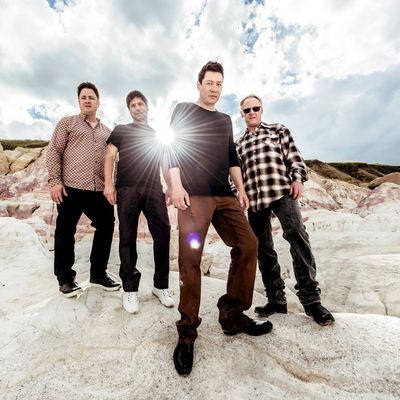Big Head Todd and the Monsters are returning to the Bing

Monster’s Music Monthly was invented when Todd Mohr decided to turn lemons into lemonade. Not long after the pandemic started, Mohr, who fronts the venerable Big Head Todd and the Monsters, chose to release a new song every month via iTunes and craft a video to accompany each tune.
“It was time to try something different then, and that was Monster’s Music Monthly,” Mohr said while calling from his Denver home. “Everything changed in the world, and we started making some changes. After making 11 studio albums, we wanted to do something other than a conventional album. What we could do was wide open, and it made things very interesting for us during a time that was so deflating.”
Big Head Todd and the Monsters, who perform Tuesday at Bing Crosby Theater, wrote and recorded new songs, rearranged its own material and covered some of their favorite songs. “Some of our versions of other people’s songs really connected with people, and we had so much fun playing around with certain tunes,” Mohr said.
A spirited take on Bruce Springsteen and the E Street Band’s “Rosalita,” bolstered by Blues Traveler frontman John Popper’s harmonica solo in lieu of the late Clarence Clemons’ saxophone, is solid. Mohr and his bandmate’s version of one-hit-wonder Looking Glass’s “Brandy” is arguably their finest work of the MMM sessions thanks in part to the addition of a backing vocalist and a horn section.
“People love what we did with that song,” Mohr said. “The lead singer of Looking Glass (Elliot Lurie) said that it made him proud. It has gotten more than 650,000 views.” Since the cover was so embraced, don’t be surprised if it ends up in Big Head Todd and the Monsters’ set at the Bing. “It’s possible,” Mohr said. “We have no problem playing covers.
“We’ve covered Pretenders songs, Led Zeppelin songs. We try to have fun up there. After all of these years, we have a lot to choose from. I have a program on my iPod. There are 220 songs on there. There are songs we have to play like ‘Bittersweet,’ but much of it is up to us and of course the fans who make requests.”
Mohr, 56, has been flanked by bassist Rob Squires and drummer Brian Nevin since the group formed in 1986, making it one of the longest-running acts with original members. To put it in perspective U2, which formed in 1976, is one of the few bands with a longer track record with those who remain after the formation of a band.
“What we have is like having a great marriage,” Mohr said. “Relationships are what it’s all about in life. I work with people I trust. We listen to each other. We’re just a great team. This has been an awesome experience being around these guys. We’re as close as you think we might be. All that we experienced has brought each of us great joy. We realize what a privilege it is to be able to make music as Big Head Todd and the Monsters.”
The band, which also includes keyboardist Jeremy Lawton, who joined in 2004, will craft its first conventional album since 2017’s “New World Arisin’” during the spring. “New World Arisin’” is one of the most muscular albums of the band’s career. “You don’t want to do the same thing every time out,” Mohr said. “I know that’s the way it is for me. Everybody in the band wanted to make a hard rock album. It was that simple.”
Mohr grew up on the sounds of Led Zeppelin and Jimi Hendrix while coming of age in Denver during the 1970s. “When I was a kid, that kind of music and metal was a rite of passage for boys,” Mohr said. “But it never completely left me. It’s cool how it has resurfaced after lying dormant for many years.”
Mohr graduated to blues and R&B when he hit his late teens. He formed Big Head Todd and the Monsters during his early 20s and has often mixed rock with blues and a hint of jazz. “That’s what I was feeling at the time,” Mohr said. “We’ve always been true to ourselves in this band. We never played anything that we weren’t into playing. The cool thing about what we’re doing now is that it happened organically.”
Mohr said he and his bandmates can’t believe they’re approaching 40 years as a band.
“It’s wild,” Mohr said. “To still be viable, creating new songs, is a lot of work, but it is quite an accomplishment.”